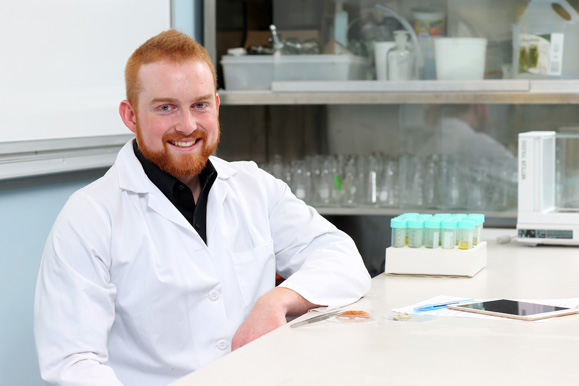Brad Elliott
A dream come true for budding scientist, Brad Elliott
‚ÄúI never thought that I‚Äôd be doing research that would bring me to another part of the world,‚ÄĚ said Brad Elliott.Őż ‚ÄúIt‚Äôs definitely a dream come true.‚ÄĚ
A native of Wallace, Nova Scotia, Brad Elliott is a recent graduate of the Faculty of Agriculture returning to campus to pursue his Masters degree alongside Dr. Sarah Stewart Clark.
Brad‚Äôs work is part of newly- funded projects with Dr. Sarah Stewart- Clark through the Schulich Ocean Studies Centre Initiative.Őż The funding allows for collaboration between ocean researchers at H¬ĢĽ≠ University and the National Center for Mariculture in Eilat, Israel.Őż ŐżŐżIn partnership with Dr. Noa Shenkar at Tel Aviv University in Israel, Brad‚Äôs project will examine invasive tunicates.
‚ÄúI‚Äôm looking forward to this project for a number of reasons and to travel to another part of the world to collect data is the icing on the cake,‚ÄĚ said Brad.Őż "Being able to study at the AC on a project like this is absolutely perfect. I'll be working on the sort of project I've only dreamed about, with a group of very talented and like-minded experts."
 Brad and Dr. Stewart- Clark will be investigating molecular mechanisms that drive tunicate species invasions.
Brad and Dr. Stewart- Clark will be investigating molecular mechanisms that drive tunicate species invasions.
‚ÄúBy using whole transcriptome analysis of these tunicates we hope to explain the molecular mechanisms that confer an advantage on the tunicates that are able to invade new territory,‚ÄĚ explained Dr. Stewart- Clark.Őż This is novel research in aquatic invasive species and I am very excited to see what we will discover.‚ÄĚ
Studying invasive species and how they operate is important to Atlantic Canada and abroad.
‚ÄúThe marine ecosystems of Atlantic Canada have been significantly impacted by a multitude of tunicate species invasions,‚ÄĚ said Dr. Stewart- Clark.Őż ‚ÄúIn medical biology, we can quickly screen out strains of bacterial that are not virulent and pose a lesser threat to human health than other virulent strains of bacteria. This allows us to focus on the strains of bacteria that pose the biggest threat to human health. I believe that the future of detection for invasive tunicate species lies in a similar pathway.‚ÄĚ
This could make mitigation strategies more efficient within the industry by only focusing on the most aggressive genotypes of invasive species.
Dr. Stewart- Clark is looking forward to having Brad back in the lab.
‚ÄúBrad was an extremely strong fourth year student in my lab and I am thrilled that he will be conducting his MSc in this area.Őż In my view, Brad has a very exciting career as a scientist in his future and I know he is looking forward to snorkelling and scuba diving in the Red Sea and Mediterranean Sea to collect samples.‚ÄĚ
Brad knows what to expect from this next chapter at the AC- hands on research and one-on-one interaction with students, professors and the industry.Őż ‚ÄúDuring my undergrad at the AC, I got to work very closely with other students and professors and this interaction gave me a hands-on feel for what scientific research is all about,‚ÄĚ Brad explained.
One unexpected surprise, though, was the opportunity to conduct research in another country.
‚ÄúI never thought that I‚Äôd be doing research that would bring me to another part of the world,‚ÄĚ said Brad.Őż ‚ÄúIt‚Äôs definitely a dream come true.‚ÄĚ
The H¬ĢĽ≠ University Faculty of Agriculture‚Äôs aquaculture team is certainly making waves, both at home and abroad.
Őż
